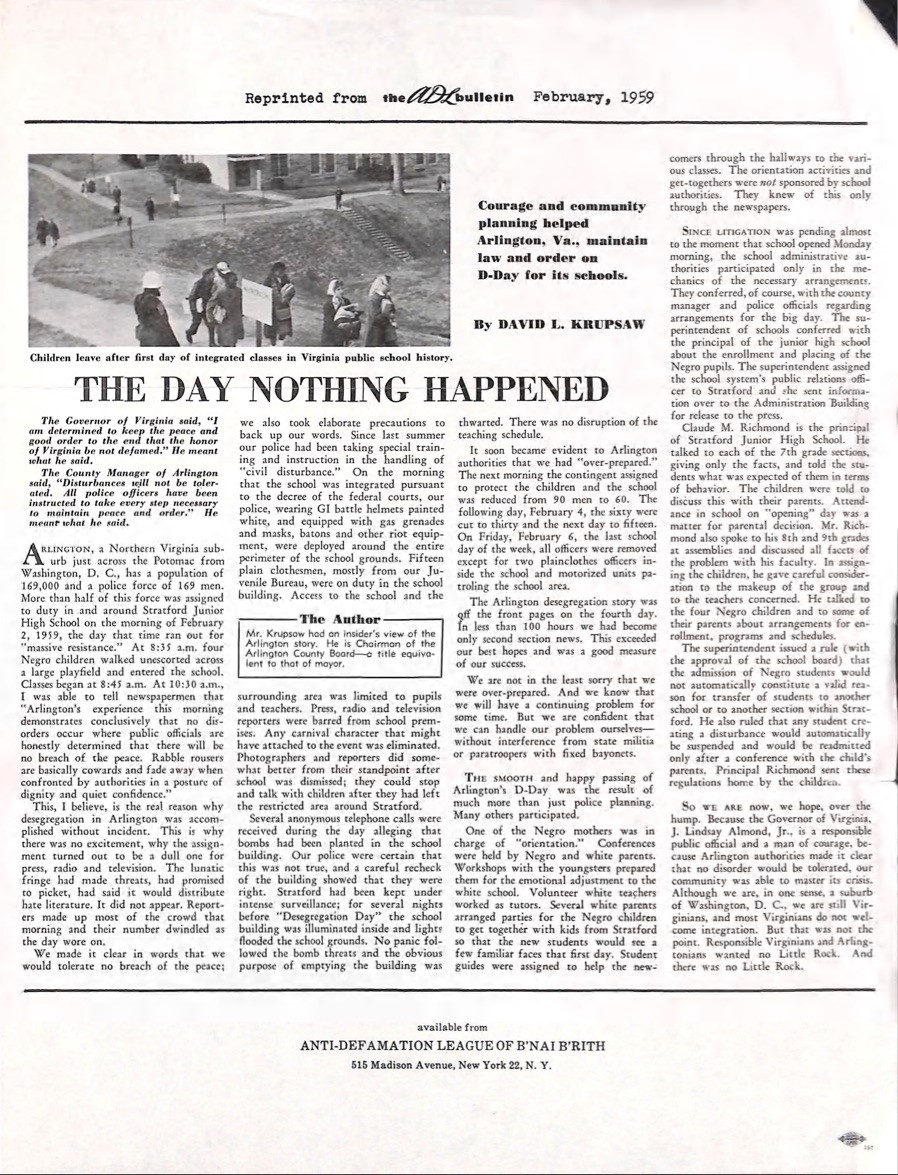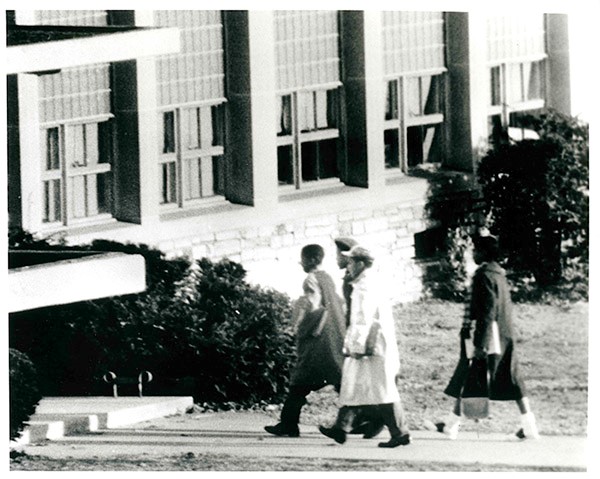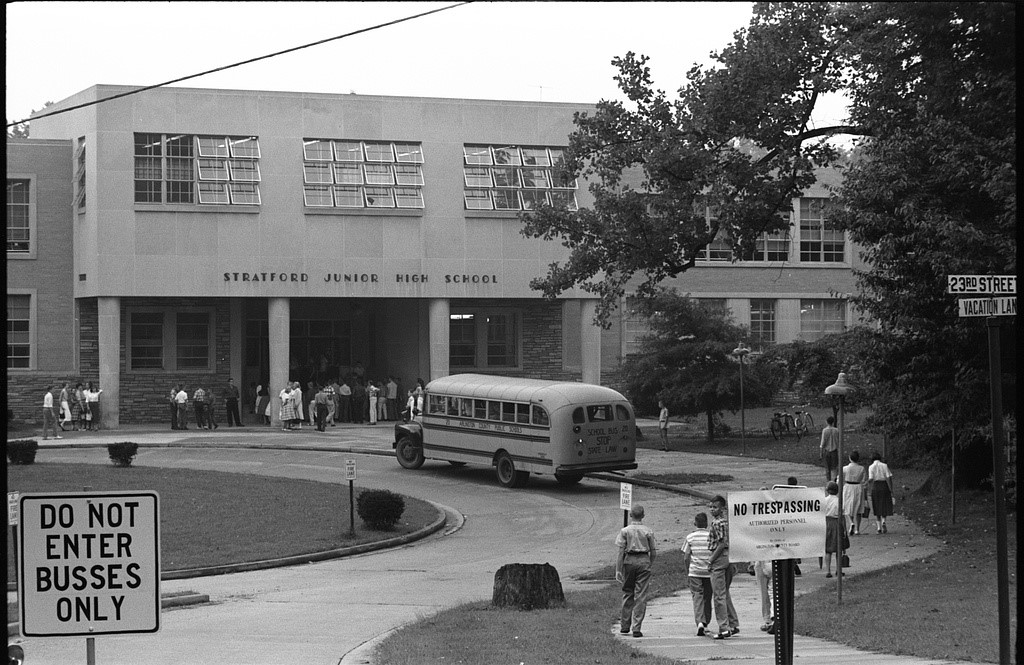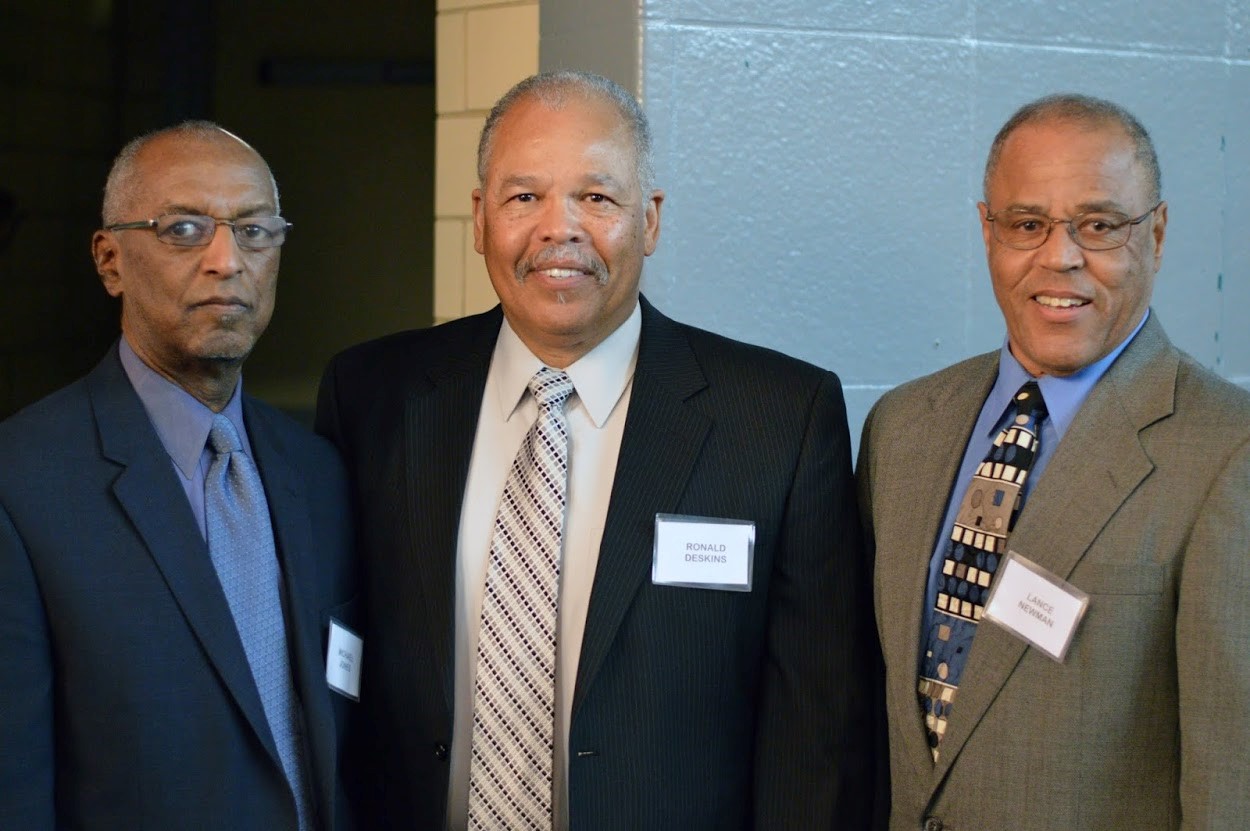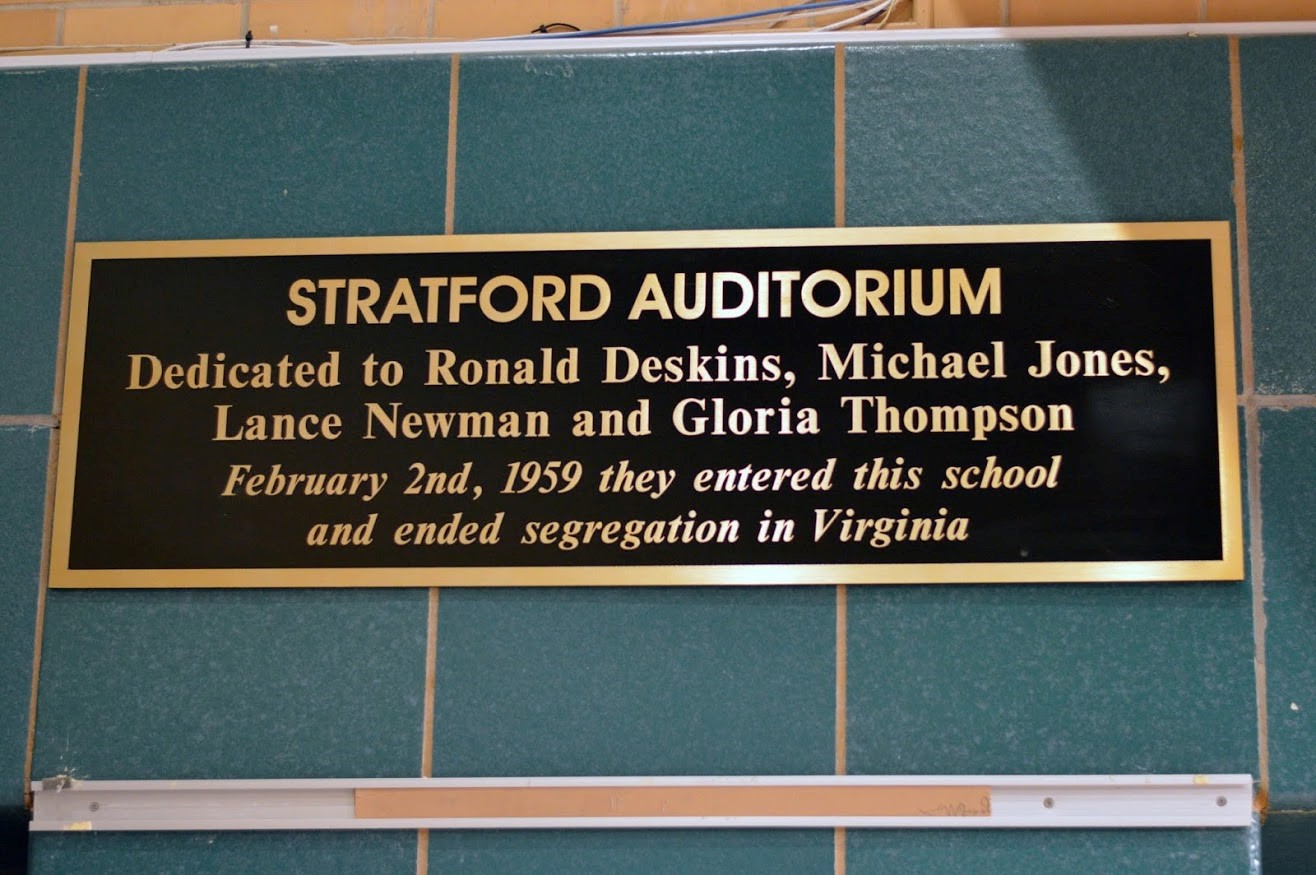Interviews with Lance Newman and Michael Jones

Oral histories are used to understand historical events, actors, and movements from the point of view of real people’s personal experiences.
This week marks the 62nd anniversary of the desegregation of Arlington Public Schools. On February 2nd, 1959, four students – Lance Newman, Michael Jones, Ronald Deskins, and Gloria Thompson – entered Stratford Junior High School, making them the first students to desegregate any public school in Virginia.
This 1959 article from the Anti-Defamation League describes the first day of integrated school at Stratford Junior High School in Arlington and the preparations that had been made to make a smooth transition.
This momentous event was the culmination of decades of work from activists and community members who navigated both legal action and other acts of protest to reach this landmark decision.
In the following oral history interviews, Lance Newman (1946-2018) and Michael Jones describe their experiences attending Stratford, what the preparation leading up to February 2nd looked like, and their experiences growing up in the close-knit community of Hall’s Hill. In this segment, Newman and Jones discuss their first days at Stratford.
Narrator: Lance Newman
Interviewer 1: Judith Knudsen
Interviewer 2: Joanna Dressel
Date: February 13, 2016
Judith Knudsen: Let’s go back to that first day and describe the first day.
Lance Newman: Okay. Let’s see. I remember getting up, getting ready, and I think my mom was—she was probably—she told me later she was a nervous wreck.
JK: I’m sure.
LN: Yeah. And I was kind of. I wasn’t—because I was there with my buddies. Actually, Ronnie and Michael and I were really good friends because we played softball together. Gloria—I knew Gloria, but I kind of felt sorry for her because she was the only girl. But so, we went down, and we all gathered at Ronnie Deskin’s house. And there were reporters there and then all the people—community leaders. And then, we sat around and they took pictures. We got some pictures, then we piled into Mr. Jones’ car and went down to Stratford, and I guess on Old Dominion Drive they let us out, and we went—we actually went in the back of the school, not the main entrance at the front. I remember going down and getting off—crossing Old Dominion Drive. They had blocked it off—and then walking down the long pathway near the football field and tons—well, it seemed like just a gauntlet of Arlington County police. They were in their riot gear with helmets and their riot gear.
LN: And actually, we were walking in by ourselves. They purposely had us come after school started, so we just went in. We went into the central entrance near the flagpole in the back, went to the principal’s office, Mr. Richmond. They sort of had—they had a conference and they told us what to expect and all of this, tried to calm us, I guess. And then we were escorted down to our first class, and I remember going into—well, he was—my math teacher was Mr. Marks—and going into the class and seeing about thirty or—thirty all-white faces, and it was kind of tense. He was pretty good because he shook our hands and stuff and said, “Kids, this is—” and had us sit down. He had a seat and a desk for us. It was right upfront.
LN: And that was a Monday, I believe. Yeah, it was a Monday. And then, the next day—I mean it went okay. That class—and then I remember the first-period bell ringing and going out in the hallways, and Stratford was a lot bigger than HB*. I went to HB first. And I was going out in the hallway and seeing this mass of humanity changing classes, and people were kind of—pretty much—I think they were kind of staring. People were kind of—you know—wanted to ignore us. But it was tense, and then that day after school, we went back to—I guess actually we went back to my house, and then we had this press conference with the—and I remember the Washington Post and the local television stations were there and had big cameras set up, and a guy interviewed us.
*Note: Hoffman-Boston was, until 1964, the only high school for African American students in Arlington. It remained open until its final graduating class in 1964 and reopened as an elementary school in 2000.
Narrator: Michael Jones
Interviewer: Judith Knudsen
Date: July 17, 2016
Stratford Junior High School, 1959. Image courtesy of the Library of Congress.
Judith Knudsen: So, what do you remember about the day when you—when it happened? What was—?
Michael Jones: You know, the further we get away the furthest—the more I forget. The only thing I remember is getting up early that morning and crossed my mind—they dressed me and made my hair and all that—made sure my hair and everything was looking good—nice long coat and everything. We were to meet at Ronnie’s house, and then—our house is right where I stayed—my mother lives now. So, Ronnie’s house is in apartments. Well, I’m two minutes away—just across the street—and you go down to his apartment there. So, we went to his apartment, and someone drove us around—drove us to the school. Now, my recollection—and I talked to Ronnie and Lance, and they think it’s different. I always thought—and it’s too bad it’s not to the day where I could—where it would be on YouTube. I could just look it up.
JK: Exactly.
MJ: Yeah. But I always thought we went into our—Vacation Lane—went in that way, straight down that little street there and went up the steps. But they said we went in the other way. But I don’t know. I guess somebody’d go to—but anyway, went in there and we met with Mr. Claude Richmond for a while.
JK: He was the principal.
MJ: He was the principal at the time. He met with us maybe—I guess less than a half an hour before we went into class, and Ronnie and Lance were together, and me and Gloria were together. I think now that’s because Ronnie and Lance went to the Methodist church at the time. Gloria and I went to the Baptist church. So, I think that’s why they put us together in classes. And we went to the first class and—
JK: What was that like?
MJ: I don’t know. You know what? I can not—I don’t remember anything that stood out negative. So, to me, it was just a normal class. We went in there, and I guess I didn’t know anybody, which was difficult when you go—most classes—
JK: Of course. New class.
MJ: Yeah, yeah. I mean, I didn’t know anybody, so when we went into class, I guess we sat pretty close to each other, and that was it. Came out. I guess we had a ride home that first week or so—something like that. Or maybe first—maybe—I don’t know. Came home and it was—it was up. Fairly uneventful year. The only thing that I can think about that first year is some guys used to call us names in the hall, and that’s it. But nothing even bad as you see today—getting beat up or anything—and I guess because the focus—everybody knew the focus was on us at the time. If anything happened, it would be negative on not only them but the school, the state, and everybody else. So, nothing happened, it was uneventful except for those.
JK: And did—my understanding was that you stayed in the same class for all the classes. I mean, you changed classes, but you had the same group, so it was the same group all the way through the day.
MJ: Yeah. Correct. Right. I don’t remember me being in the class by myself that first year. I think Gloria was in all my classes I had.
From left to right, Michael Jones, Ronald Deskins, and Lance Newman at the February 2, 2016, County event, “An Evening to Celebrate Arlington’s History Makers.” Photo by Blake Tippens.
A plaque dedicating the Stratford Auditorium, February 2, 2016. Photo by Blake Tippens.
Learn more:
”The Story of Arlington Public School Desegregation,” tells a detailed narrative about the history of the desegregation of APS
”Oral History: Desegregation of Arlington’s Public Schools” and “A Fight for Educational Equality: Civil Rights Activist Dorothy Hamm” both detail the life and work of Dorothy Hamm, who led the efforts to desegregate APS
Project DAPS is a digital exhibit featuring nearly 2,000 digitized documents and stories related to the desegregation of Arlington Public Schools from the Arlington Public Library’s Community Archives
”Back to Stratford: Honoring Arlington’s History Makers” features a panel discussion with Michael Jones, Lance Newman, Ronald Deskins, and other community members about the desegregation process and it's legacy
The goal of the Arlington Voices project is to showcase the Center for Local History’s oral history collection in a publicly accessible and shareable way.
The Arlington Public Library began collecting oral histories of long-time residents in the 1970s, and since then the scope of the collection has expanded to capture the diverse voices of Arlington’s community. In 2016, staff members and volunteers recorded many additional hours of interviews, building the collection to 575 catalogued oral histories.
To browse our list of narrators indexed by interview subject, check out our community archive. To read a full transcript of an interview, visit the Center for Local History located at Central Library.
